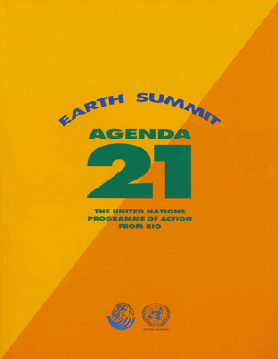Agenda 21 - Wikipedia, the free encyclopedia: Agenda 21 is a non-binding, voluntarily implemented action plan of the United Nations with regard to sustainable development. It is a product of the UN Conference on Environment and Development (UNCED) held in Rio de Janeiro, Brazil, in 1992. It is an action agenda for the UN, other multilateral organizations, and individual governments around the world that can be executed at local, national, and global levels. The "21" in Agenda 21 refers to the 21st century. It has been affirmed and modified at subsequent UN conferences.
Agenda 21 is a 300-page document divided into 40 chapters that have been grouped into 4 sections:
Section I: Social and Economic Dimensions
This section is directed toward combating poverty, especially in developing countries, changing consumption patterns, promoting health, achieving a more sustainable population, and sustainable settlement in decision making.
Includes atmospheric protection, combating deforestation, protecting fragile environments, conservation of biological diversity (biodiversity), control of pollution and the management of biotechnology, and radioactive wastes.
Section III: Strengthening the Role of Major Groups
Includes the roles of children and youth, women, NGOs, local authorities, business and workers and strengthening the role of indigenous peoples, their communities, and farmers.
Section IV: Means of Implementation
Implementation includes science, technology transfer, education, international institutions and financial mechanisms.
***
Wish I had taken a picture
of
the two beautiful sharply dressed young women,
one African-American and the other Indian,
who talked me into a $100.00 donation;
brave enough to ring my doorbell while signs in my yard questioning whether God raped Mary or not.
They confessed to thinking twice before walking up to my house.
Democratic Party of Georgia only gets a $50.00 donation every time they ring my doorbell; and I generally find those young men...
CUTE!


.jpg)

No comments:
Post a Comment